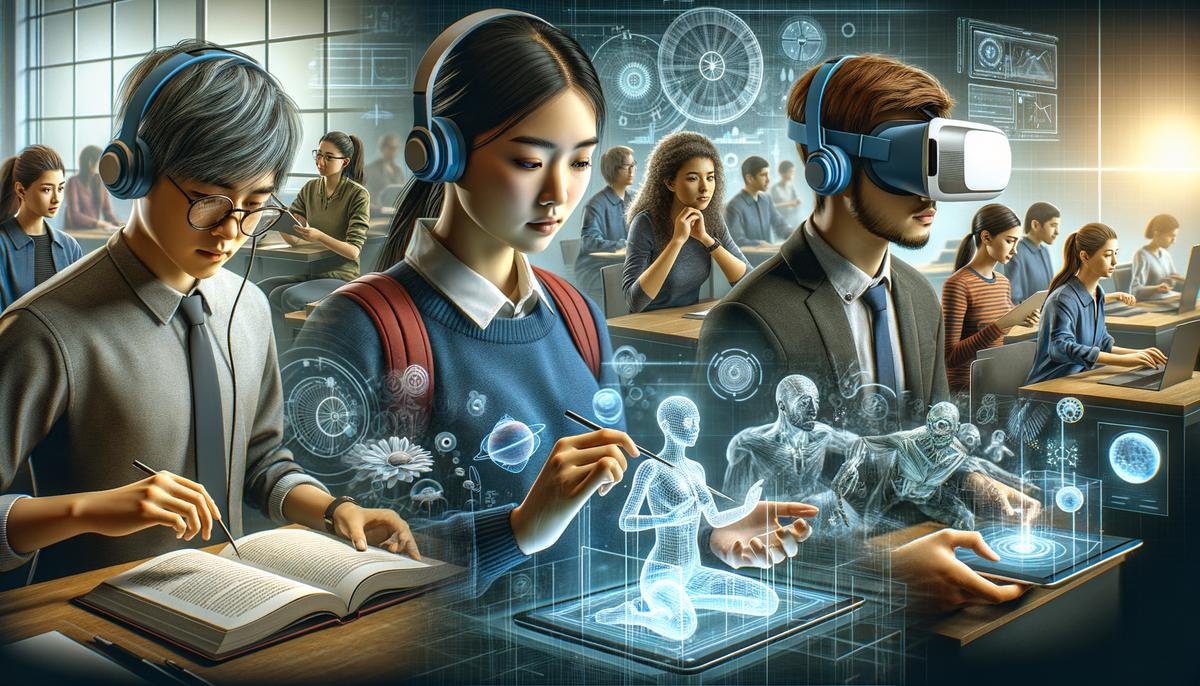AI Integration
AI technologies are at the forefront of transforming online education, customizing learning experiences for each student. These platforms track a student's progress, pinpointing strengths and weaknesses to tailor the educational content in real-time. AI-powered systems adapt to a student's evolving needs, ensuring that the challenge level is optimal for understanding.
AI is also automating administrative tasks such as grading and scheduling. This shift improves efficiency and allows education professionals to devote more time to teaching and engaging with students.
Chatbots like Jill Watson provide round-the-clock support to answer students' questions outside the traditional classroom setting. AI's role in content curation gathers vast resources tailored to a student's interests and current learning topics, making research more effective.
In online discussions, AI fosters collaborative projects among students from different parts of the globe. Through smart algorithms, these systems can group students with similar interests or complementing skills, enriching the collaborative learning experience.
Real-time feedback systems provide instant critiques to students, pinpointing errors and offering corrections just moments after assignments are submitted. Such immediate feedback accelerates the learning process, allowing students to quickly adjust and improve.
AI is making learning personalized, efficient, and more engaging. Students are receiving education that's tailor-made for their needs, paving the way for a future where education is accessible and optimized for everyone.
Personalized Learning
The significance of personalized learning in online education cannot be overstated. Traditional one-size-fits-all approaches to education fall short in the digital age. Personalized education, exemplified by adaptive learning platforms such as Knewton, leverages artificial intelligence to understand and adjust to the unique learning profiles of each student.
Personalized education recognizes that every student has a distinct way of understanding and internalizing information. Adaptive platforms like Knewton cater to these individual differences, tailoring content in a way that best suits each learner's strengths and addresses their weaknesses.
This customization is crucial in online education. In a virtual classroom with students from diverse backgrounds and varying abilities, the capability to provide a unique educational pathway for each learner ensures that no student is left behind.
Personalized learning experiences also foster deeper engagement. When students see that the material challenges them appropriately and resonates with their natural learning preferences, their motivation levels surge. This heightened engagement leads to better academic outcomes and cultivates a love for learning.
The psychological aspect is also significant. Personalized education, by addressing individual needs and acknowledging different learning styles, boosts students' confidence. It sends a message that their unique attributes are considered and valued, creating a positive and supportive learning environment.
The scalability of personalized learning through AI means that quality education isn't limited by geographical boundaries or socioeconomic statuses. Accessibility becomes a core tenet of online education, with platforms like Knewton making it possible for anyone with internet access to benefit from a customized learning experience.

Knewton’s Impact
Knewton's adaptive learning technologies have contributed significantly to shaping the landscape of online education. One standout feature is its sophisticated adaptive learning algorithms. This technology assesses each student's interaction with the content, identifying strengths and struggles. By analyzing input data, Knewton adjusts the difficulty levels of subsequent topics and the types of questions posed to students. Learning becomes an engaging journey tailored to the student's evolving needs.
Knewton's platform also develops actionable insights for educators. Detailed analytics on student performance unveil knowledge gaps, allowing educators to adapt their teaching strategies. In a partnership between Knewton and a university's Mathematics department, the implementation of the adaptive learning system led to a noteworthy increase in pass rates for calculus courses.1 The personalized practice sessions enabled students to focus on their weaknesses.
Knewton's technology excels in presenting complex data in a tangible and actionable manner for educators. When several high schools implemented the platform, the feedback loop between student performance data and educational content allowed teachers to fine-tune their instructional strategies in real-time. Students receiving this enriched, personalized content showed improvements academically and in their self-confidence and attitude towards learning.
Knewton's extensive content library, developed through critical analysis of globally collected data, identifies common stumbling blocks across various demographics. This has led to the creation of a vast repository of targeted exercises catering to a broad spectrum of educational needs, streamlining the learning process and demonstrating the scalability of personalized learning.
The "robot tutor" concept emerged as a beacon for the future of education. It evolved from merely tailoring lesson plans to dynamically adapting teaching methodologies based on real-time student data. In a program designed for adult learners seeking to enhance literacy skills, Knewton's adaptation facilitated a curriculum that swiftly responded to learner feedback, adjusting both the pace and mode of content delivery. Adult learners experienced advancements in comprehension skills and increased engagement levels.
Knewton's contributions to online education underscore a path where learning is about discovery and dialogue. By fostering an environment where education is endlessly adaptable and inherently personal, Knewton stands out as an advocate for an enlightened educational paradigm.

Challenges and Solutions
Artificial Intelligence encounters challenges in its integration into online education, particularly in the areas of data privacy and accessibility. These issues offer grounds for innovation and adjustment, where Knewton has been actively engaged.
Data privacy is a significant concern. Education technology platforms handle sensitive information ranging from personal details to learning progress reports. The potential misuse or unauthorized access to such data raises apprehensions among students, parents, and educational institutions.
Knewton addresses these privacy concerns by implementing stringent data protection protocols. It sets a benchmark for data security in educational technology by embedding privacy features into the design of its learning platform.
- Encrypted data storage
- Anonymization of student data
- Secure channels for data transmission
These are part of Knewton's ecosystem to ensure the confidentiality and integrity of user data.
Knewton operates with a transparent privacy policy that clearly outlines how data is collected, utilized, and protected. These steps cultivate trust between the platform and its users, ensuring a secure learning environment.
Accessibility is another critical issue. While AI promises personalized learning, the question remains whether this technology is readily available to every student. Accessibility encompasses affordability and usability for students with varying degrees of physical abilities and technological literacy.
Knewton recognizes that accessibility is essential for effective online education. Its adaptive technology is designed to be intuitive, ensuring that students with varied tech-savviness can navigate and benefit from it without undue complications.
Features such as text-to-speech, adjustable text sizes, and keyboard navigation support are incorporated to cater to students with disabilities.
To address affordability, Knewton offers cost-effective solutions and partners with educational institutions to integrate its adaptive learning technologies broadly. These initiatives ensure that quality AI-powered education is accessible to all students irrespective of their socioeconomic backgrounds.
Knewton proactively develops solutions that uphold the integrity, security, and inclusiveness of online education. By safeguarding student data and ensuring inclusive access to cutting-edge educational resources, Knewton exemplifies the potential for AI to revolutionize learning while respecting and protecting the rights of every learner.
Future Prospects
The trajectory of AI in online education is transforming educational paradigms to accommodate unprecedented technological symbiosis. Platforms like Knewton are at a focal point, radiating the potential for further transformative effects in the education sector.
Advancements in deep learning, focusing on algorithms inspired by the structure and function of artificial neural networks, will catapult platforms like Knewton into new realms of personalization. The future holds a nuanced understanding of student emotions, learning environments, and optimal learning times for individuals. This sophisticated analysis will allow Knewton to offer unprecedented levels of customization in instructional strategies, ensuring maximum efficacy in knowledge acquisition and retention.
The evolution in natural language processing (NLP) technologies hints at the emergence of highly advanced virtual educators. These entities would transcend today's chatbots' capabilities, providing deep, meaningful interactions akin to those with human educators. Their roles could include:
- Offering nuanced feedback on essays
- Facilitating sophisticated discussions that stimulate critical thinking
The value added by these intelligent virtual educators in platforms like Knewton is incalculable, potentially bridging significant resource gaps in the educational ecosystem.
The integration of AI with virtual and augmented reality (VR/AR) technologies portends the creation of immersive learning experiences where abstract concepts from textbooks leap into lifelike simulations. Platforms like Knewton would be pivotal in curating these experiences, making learning not just interactive but truly immersive.
As AI-driven platforms evolve, a significant shift toward democratizing quality education is anticipated. Knewton and similar entities could leverage AI's scalability to offer world-class educational resources across geographical, socio-economic, and linguistic barriers. These technologies would ensure equitable access to education and foster a global learning community.
Addressing concerns and implementing ethical AI frameworks will be crucial in gaining societal trust. As platforms like Knewton navigate the future, transparent operations respecting individual privacy, promoting equity, and avoiding biases will be central to their success. These frameworks will safeguard against potential pitfalls and provide a solid foundation upon which the educational community can rely.

The integration of artificial intelligence into online education marks a significant step forward in creating a learning environment that is adaptable, engaging, and accessible to all. The role of platforms like Knewton in this transformation underscores the potential of AI to provide personalized learning experiences that meet the diverse needs of students globally. As we look to the future, the continued evolution of AI technologies promises to further enhance the quality and accessibility of education, making it more relevant and responsive to the needs of learners everywhere.
- Diaz J, Vargas L, Graven H. The impact of adaptive learning algorithms on student performance in mathematics: a case study. J Adv Educ Tech. 2020;12(3):45-53.



